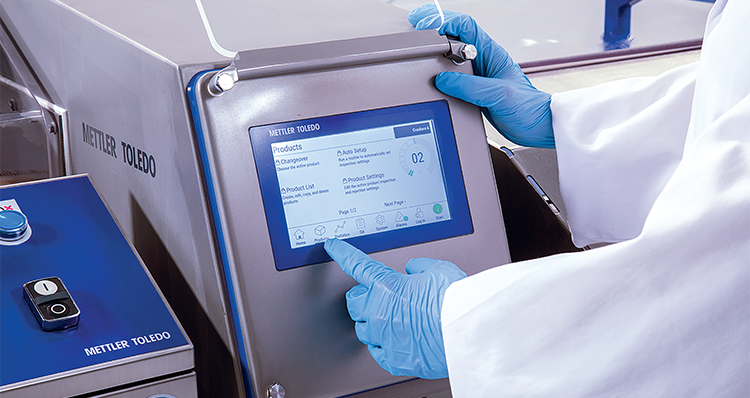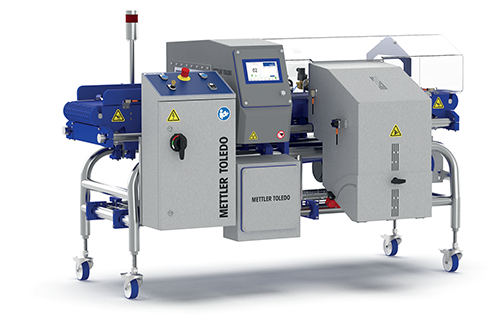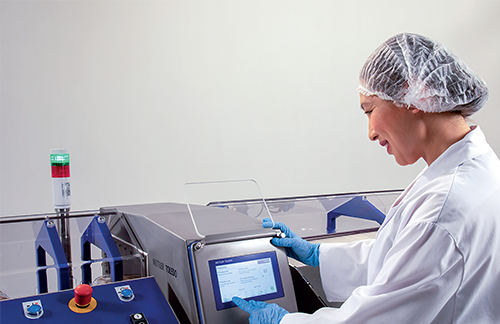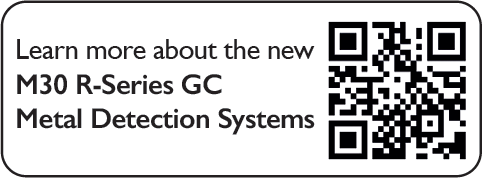
Mettler Toledo Safeline
Detection and inspection
Having continued to grow throughout the pandemic, Mettler-Toledo Safeline is leading the market when it comes to innovations in metal detection technology developments
As the world ground to a halt in early 2020 with the arrival of Covid-19, life at Mettler Toledo Safeline kept on going. While the pandemic sent whole cities and countries into lockdown, restricted people to their homes and forced business to close, the business for Mettler Toledo continued to grow as sales soared. “In 2020, we didn’t really see a downturn at all,” admits Mettler Toledo Safeline Head of Sales Mike Bradley. “Then in 2021, we had even better news, as we saw a sizeable upturn in business and rode out the whole pandemic with virtually a full shop floor.”
 As a specialist in the supply of metal detectors and detections systems for food and pharmaceutical companies, the vast majority of Mettler Toledo’s customers saw neither a decline in demand, nor a halt to their operations. “We play a crucial role within the food and pharma safety industry, and as such we were deemed to have keyworker status,” Mike explains. “Fortunately, most food manufacturers can’t cut corners when it comes to food safety.”
As a specialist in the supply of metal detectors and detections systems for food and pharmaceutical companies, the vast majority of Mettler Toledo’s customers saw neither a decline in demand, nor a halt to their operations. “We play a crucial role within the food and pharma safety industry, and as such we were deemed to have keyworker status,” Mike explains. “Fortunately, most food manufacturers can’t cut corners when it comes to food safety.”
But Mettler Toledo Safeline encountered a new challenge: How best to guarantee the safety of their workforce of 300 employees? “Our office staff were able to work from home, but our employees on the shop floor didn’t have that luxury,” Mike says. “To protect them, we instigated a very rigorous lateral flow test program in partnership with the local council, testing everyone at least twice a week, doing a total of about 14,000 tests, in addition to temperature checks on arrival, mask wearing and maintaining a two metre plus distance from others at all times. That made everyone feel comfortable entering the building, and gave them the confidence that we were doing everything within our power to make it safe for all our employees who had to work onsite.”
But the company didn’t forget about those working from home. “A hybrid working situation causes its own challenges,” Mike explains. “In my team, we ran a weekly quiz on a Friday, checking in to see how everyone was coping, and helping them all to feel involved. As restrictions have loosened, we’ve not put too much pressure on people to return to the office yet. However, with over 300 people here, we recognize the importance of getting people together to meet, network, and to be reminded that they’re not working as individuals – they’re part of a bigger team, so we’re keen to take advantage of those opportunities to collaborate and network face-to-face in the near future.”
A proven innovator
Little could have prepared Mettler Toledo for the shock of the pandemic. Nevertheless, one of the implications of the last two years has been the acceleration of pre-existing trends. “Even before Covid-19, there was a clear desire among the global multinationals to drive efficiency by taking people out of the process where possible,” Mike explains. “As a consequence, we’ve been firmly developing our metal detection portfolio with a number of features to allow our customers to reduce their hands-on time with our machines.”
One such feature is clustering, a process in which similar products are grouped for inspection on a single setting, circumventing the need for manual adjustment. “Clustering came about a few years ago, driven by a desire at one of the biggest bakeries in the UK,” Mike says. “Every task that a person has to carry out on the production line takes time, costs money, and carries a risk of something going wrong. The introduction of clustering means that when a company is switching from product A to product B, its one less interaction, and one less risk.”
As businesses worldwide saw employees vanish from their factory floors, Mettler Toledo’s clustering emerged as a critical labor-saving innovation. The same is true of another of its offerings, known as Emulation, launched in 2017. Originally envisaged as an ease-of-use benefit, the company had no idea of the role that the product would play only a few years later.
“Rather than step onto the production line itself, Emulation allows customers to replicate the screen of the metal detection system on a device such as a laptop, mobile phone, or tablet,” Mike explains. “It therefore came in extremely handy within a pandemic scenario: all of a sudden, quality managers could operate the metal detector from the comfort of their office or home, and access all the data they need using a very simple tool.”
A proven innovator for major technology manufacturers, Mettler Toledo is now hoping to deliver similar benefits for mid-market food and pharma companies, with a close eye on sustainability. “Very often, small- and medium-sized food producers have high-end aspirations,” Mike says. “In the UK, for example, you might be a medium-sized producer supplying pub chains with ready meals, with a goal in three- or four-years’ time to supply Marks & Spencer, where the requirements in terms of metal detection will be a little bit higher. But, because you’re at that SME stage, you can’t necessarily afford the higher-end product inspection systems that can support the strictest retailer standards straight away.
“Therefore, six months ago we launched our M30 R-Series GC, allowing our customers to upgrade equipment over time through simple add-ons, rather than to invest in equipment that might soon become obsolete for their purposes,” he continues. “If that mid-market customer does then secure a high-end contract, it then becomes a very simple task to enhance that metal detection system and make it compatible with their needs.”
Mettler Toledo’s recent success has cast greater focus on the company’s relationship with its suppliers. “Much of what we receive are bespoke fabrications and products that are very metal-detection specific,” Mike notes. “Therefore, as we look to drive efficiencies, we’re actively partnering with businesses who can add value to our operations. At the front end of our manufacturing, that involves utilising a partner approach, in which our key suppliers will work with us to understand and assess our needs, and to explore what elements they can add before shipping their parts to us. If they can achieve that successfully, then by taking operations off our hands they’re adding to the efficiencies in-house.
“We’ve also worked closely with some of our customers to manage the supply chain issues we’ve encountered,” Mike continues. “As suppliers to some of the biggest food manufacturers in the world, many of whom also have connections to our component suppliers, we’ve been fortunate enough to utilise their strength in some situations to fast-track our shipments. Thankfully, that’s nowhere near the challenge today that it was just six-to-nine months ago, but it’s proved essential to keeping us on track. Now, we can say with confidence that there’s light appearing at the end of the tunnel.”
Remote service capacity
Mettler Toledo envisages that many of the innovations to have come out of the pandemic will remain integral parts of its business moving forward. “Looking at the landscape pre- and post-Covid-19, things have changed,” Mike confirms. “One of the things we developed within the last two years was remote service capability, giving our customers the option to have our trained engineers diagnose faults over the phone by using remote diagnostic tools. As key businesses, our customers had to keep working all year-round, but the last thing they wanted was external people on-site. Into 2022 and beyond, we’re confident that’ll become the norm.”
“Only a couple of weeks ago, we won a big order in Europe for ten Gravity Fall metal detection systems for the inspection of a sugar-crystal product,” Mike continues. “A key contributor to that success was what we call the eDemo, in which we’ll use MS Teams or Zoom, combined with television screens installed throughout our premises, in order to place potential customers directly in front of the products they’re looking to buy. Thanks to the eDemo, they can virtually touch the product: we can run tests, they can inspect the design of the equipment, its quality, cleaning or methodology, and ask us any questions they need. It’s a powerful tool, driven by Covid-19, and focused on exactly what we’re hearing from our customers.”
As it eyes up further growth, Mettler Toledo reflects positively on its position within the sector. “I always consider us lucky in that we sit down with the biggest global food and pharma manufacturers very frequently,” Mike admits. “Above all, it’s our customers telling us where they’re trying to go, and what they see as important, that drives our development and the way we go to market. As we settle into the decade, we’re developing a completely new product inspection portfolio to be introduced in the next 12-to-24 months. As long as we keep listening, we’ll be in the right place.”

Mettler Toledo Safeline
www.mt.com
Products: Metal detectors and detection systems